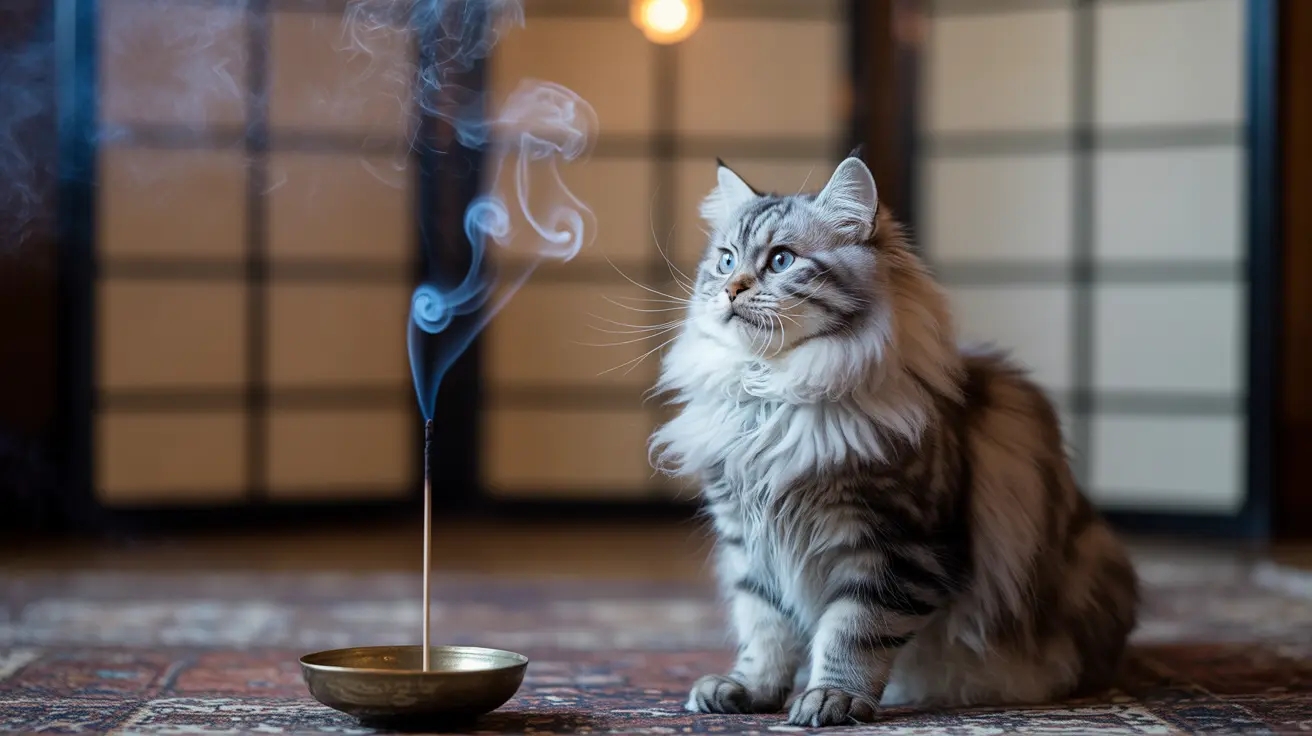If you enjoy burning incense for meditation, relaxation, or spiritual practices, you might be wondering about its safety for your feline companions. The short answer is yes - incense is generally bad for cats due to their highly sensitive respiratory systems and enhanced sense of smell. Understanding the risks and taking proper precautions is crucial for protecting your cat's health.
In this comprehensive guide, we'll explore why incense poses risks to cats, what symptoms to watch for, and how to keep your furry friend safe if you must burn incense in your home.
Understanding Why Cats Are Sensitive to Incense
Cats have remarkably delicate respiratory systems that make them particularly vulnerable to airborne irritants. Their respiratory passages are narrower than humans', and they possess an extraordinary sense of smell that's roughly 14 times more powerful than ours. This heightened sensitivity means that what seems like a pleasant aroma to us could be overwhelming or even harmful to them.
Health Risks of Incense Exposure for Cats
Immediate Health Concerns
When cats are exposed to incense smoke, they may experience several immediate symptoms:
- Coughing and wheezing
- Sneezing and nasal discharge
- Watery or irritated eyes
- Difficulty breathing
- Lethargy or unusual behavior
Long-term Health Effects
Regular exposure to incense smoke can lead to serious health complications:
- Chronic respiratory infections
- Development of asthma
- Increased risk of lung inflammation
- Potential development of lung cancer
- Chronic allergic reactions
Dangerous Components in Incense
Incense smoke contains several harmful substances that can affect your cat's health:
- Volatile organic compounds (VOCs)
- Particulate matter
- Benzene and toluene
- Potentially toxic essential oils
- Chemical fragrances
Safe Practices When Using Incense
If you must burn incense in your home, follow these essential safety measures:
Location and Ventilation
- Burn incense in a separate room from your cat
- Ensure excellent ventilation with open windows
- Use air purifiers to filter smoke
- Keep incense elevated and out of reach
Timing and Frequency
- Limit burning time to short periods
- Avoid daily use
- Monitor your cat's reaction closely
- Clear the air completely before allowing cats back in
Pet-Safe Alternatives to Incense
Consider these safer options for creating pleasant aromas in your home:
- HEPA air purifiers
- Pet-safe essential oil diffusers (used with caution)
- Natural odor absorbers like activated charcoal
- Regular ventilation with fresh air
- Cat-safe houseplants that naturally purify air
When to Seek Veterinary Care
Contact your veterinarian immediately if your cat shows any of these symptoms after incense exposure:
- Severe coughing or wheezing
- Difficulty breathing
- Extreme lethargy
- Loss of appetite
- Blue-tinted gums
- Persistent respiratory issues
Frequently Asked Questions
Is incense bad for cats, and what are the potential health risks?
Yes, incense is generally bad for cats. The smoke contains harmful chemicals and particulates that can cause respiratory issues, allergic reactions, and long-term health problems in cats. Their sensitive respiratory systems make them particularly vulnerable to these airborne irritants.
How can I safely burn incense around my cat without causing harm?
The safest approach is to burn incense in a separate, well-ventilated room where your cat cannot access it. Use air purifiers, keep windows open, and ensure your cat has a safe space away from the smoke. However, complete avoidance is best for your cat's health.
What are some safer alternatives to incense for a cat-friendly home?
Consider using HEPA air purifiers, natural odor absorbers like activated charcoal, or cat-safe plants for air purification. If you must use fragrances, opt for pet-safe products specifically designed for homes with cats.
What symptoms should I look out for if my cat is exposed to incense smoke?
Watch for coughing, wheezing, sneezing, watery eyes, difficulty breathing, lethargy, and changes in behavior. If you notice any of these symptoms, remove your cat from the area immediately and seek veterinary care if symptoms persist.
How can I minimize my cat's exposure to incense if it's necessary to burn it in my home?
Keep cats in a separate room when burning incense, ensure proper ventilation, use air purifiers, and limit burning time. Always monitor your cat's reaction and maintain a smoke-free safe space for them.
Remember, while incense may hold cultural or spiritual significance for many people, your cat's health should be a priority. Consider exploring pet-safe alternatives or limiting incense use to spaces where your cat won't be exposed to protect their respiratory health and overall well-being.






